Home » Dental Treatments » Implants
Turkey Teeth Implant – Affordable, Confidence-building Options
What is a dental implant?
A dental implant is a small post that acts like a new tooth root. It sits in the jawbone where a tooth is missing. Most implants are made from titanium, a metal the body accepts well.
After the implant is placed, the bone grows around it and locks it in place (osseointegration). Then we add a connector (abutment) and a custom crown or bridge on top.
The end result looks and works like a real tooth and helps protect the jawbone.
Best for: Replacing one or more missing teeth with fixed teeth that look and feel natural
Surgery: 45–90 minutes per implant; total treatment usually 3–6 months
The Problem it Solves
Missing teeth cause more than a visible gap. Neighbouring teeth can drift, food can trap more easily, the bite can change, and speech can be affected. The jawbone in that area can also shrink over time because it is no longer used by a tooth root. An implant fills the space and helps keep the bite and bone stable. For several missing teeth in a row, two or more implants can hold a bridge. This avoids shaping healthy teeth for a traditional bridge.
Who is a Good Candidate?
You are likely suitable if your gums are healthy and you have enough bone where the tooth is missing. If bone is thin or soft, we can add bone graft material to build support first. Good daily brushing and cleaning are important. Some health issues, like uncontrolled diabetes or heavy smoking, can slow healing. We will check your medical history and talk through any risks before we begin.
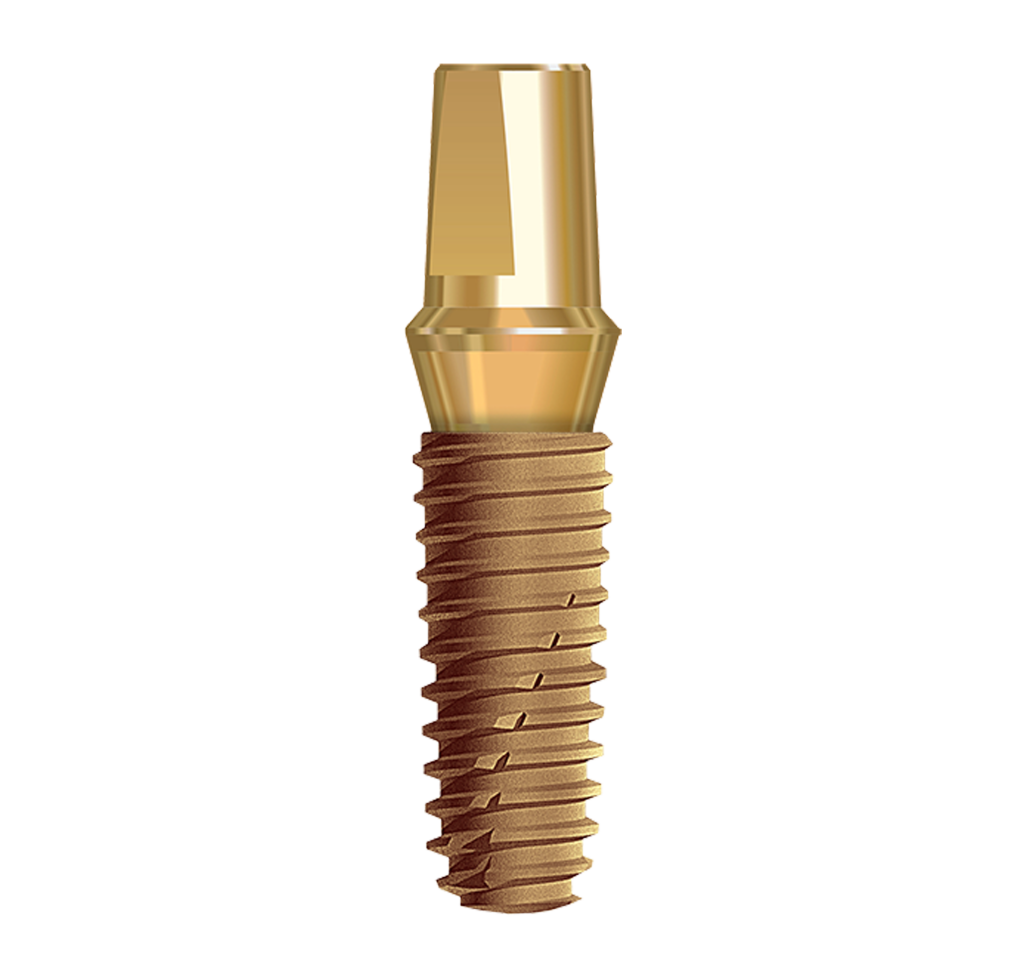
Full Jaw Restoration Options
Compare our two main protocols for full arch replacement. Choose the permanent solution that fits your needs.
All-on-4 Implants
The efficient, cost-effective solution for a full fixed smile. Uses 4 implants per jaw, often avoiding the need for bone grafting. Ideal for faster healing times.
View ProcedureAll-on-6 Implants
Maximum stability and bite force distribution. Uses 6 implants per jaw for greater strength and long-term durability. Recommended for patients with good bone volume.
View ProcedureYour Journey to a New Smile
A clear, step-by-step guide to your dental implant treatment in Turkey. From your first scan to your final smile.
Consultation & Scan
We examine your mouth and take X-rays and a 3D scan if needed. We measure bone levels and plan the exact implant position. We also discuss all options, costs, and timings in writing.
Planning & Consent
We confirm the plan that suits you. If a tooth must be removed, we may place the implant on the same day (immediate placement). Otherwise, we allow healing first.
Surgery Day
The area is numbed with local anesthetic. Most people feel pressure, not pain. We ensure the implant fits gently and precisely. A small healing cap or gum is placed over the implant.
Healing Period
The gum implies normal tenderness for a few days. The implant then fuses with the bone (osseointegration). This usually takes 8–12 weeks, but can be longer if bone grafting was needed.
Abutment & Impression
Once the implant is firm, we uncover it and attach the abutment. We take an impression or a digital scan so the lab can create your custom crown or bridge.
Fit & Fine Tune
We fit your crown or bridge and check your bite. We adjust until it feels natural and even. We show you how to clean around the implant and book your review.
Before & After Photos
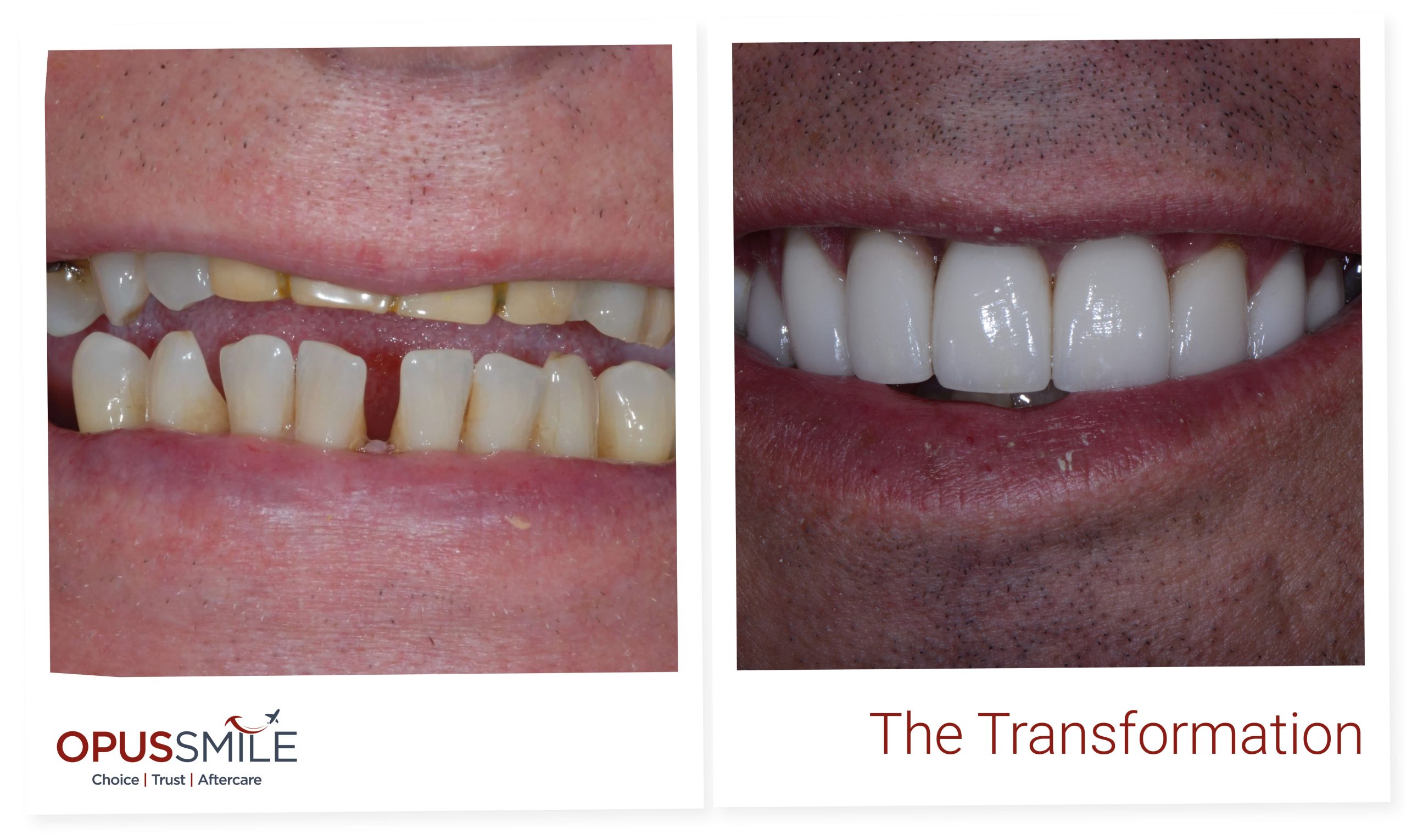
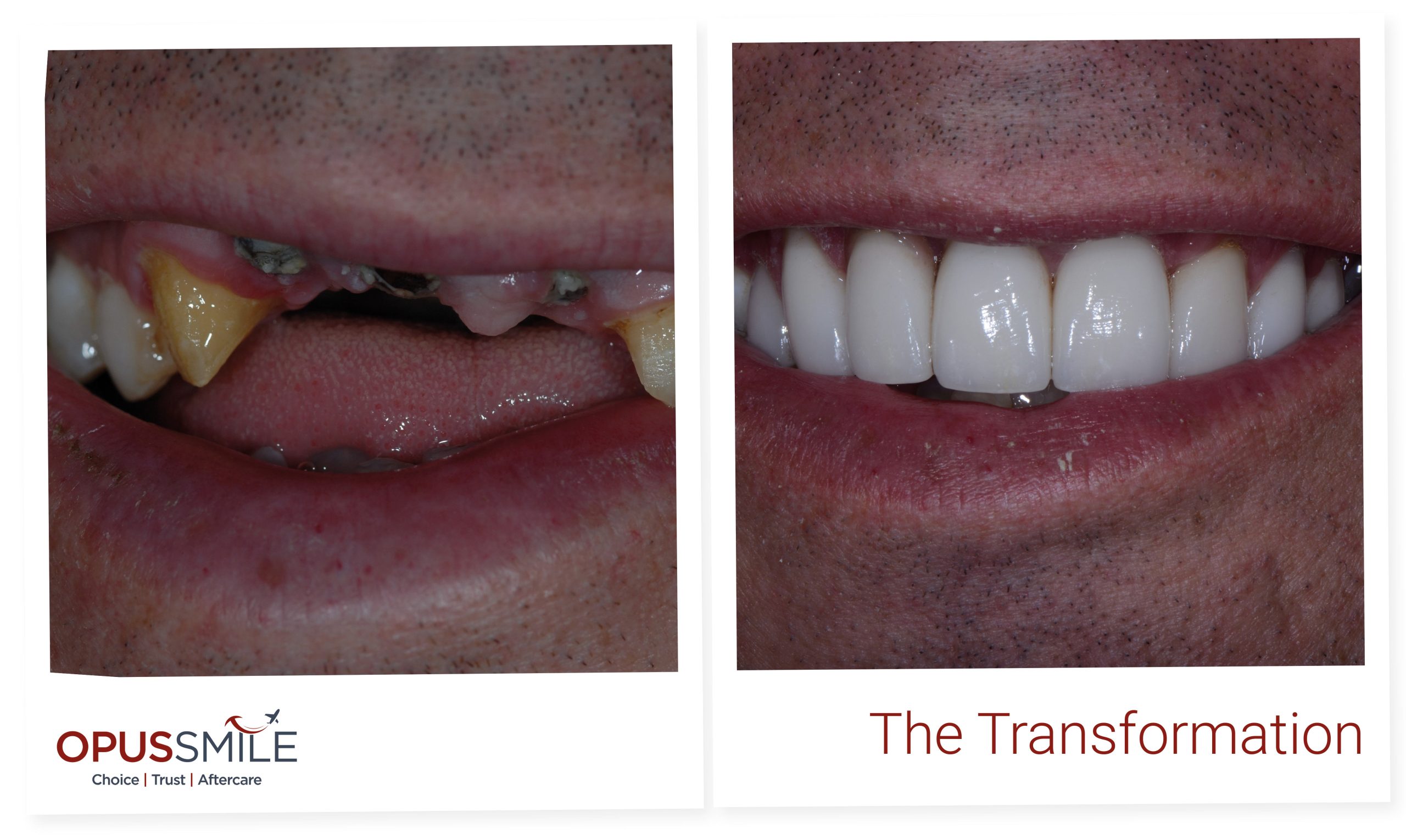
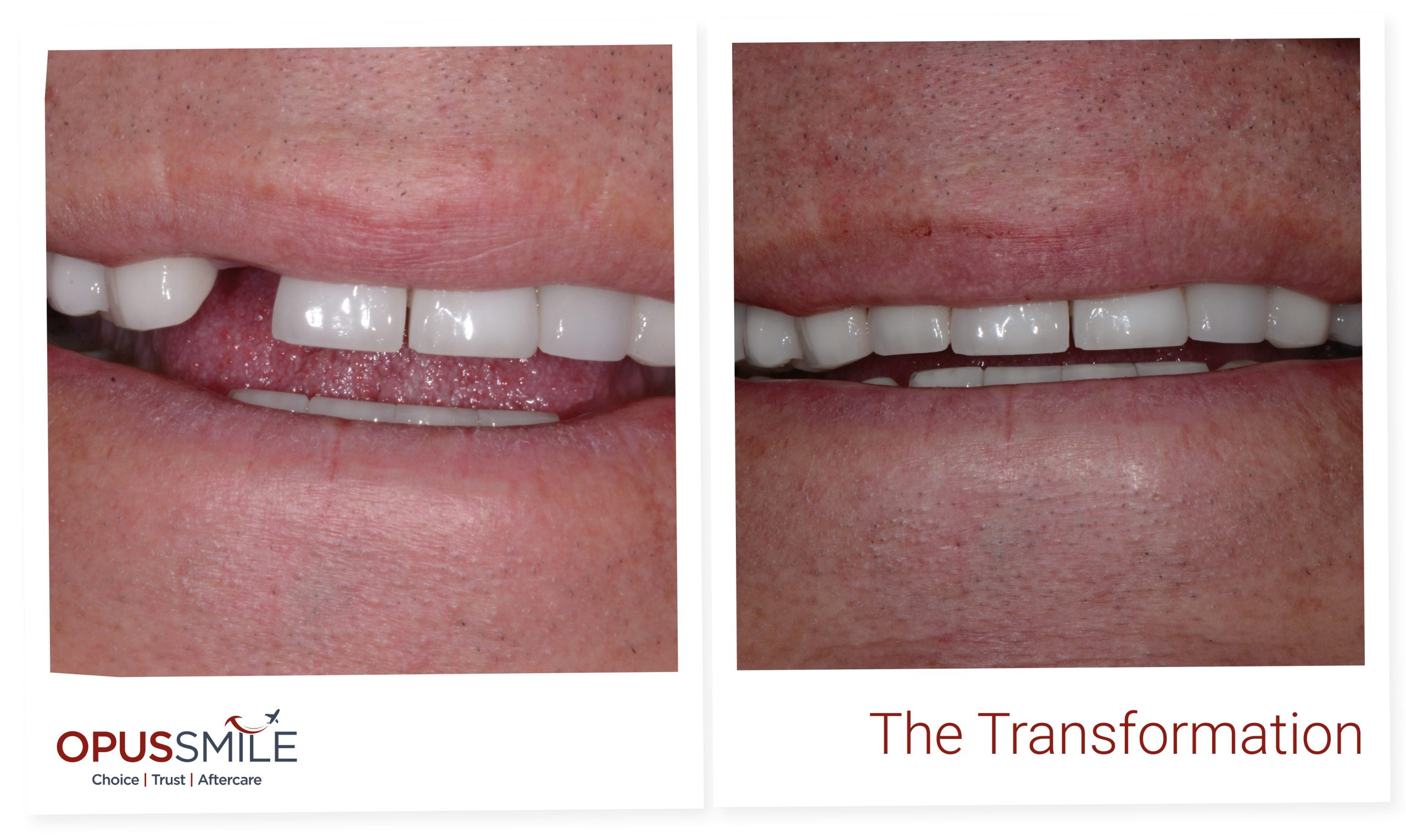
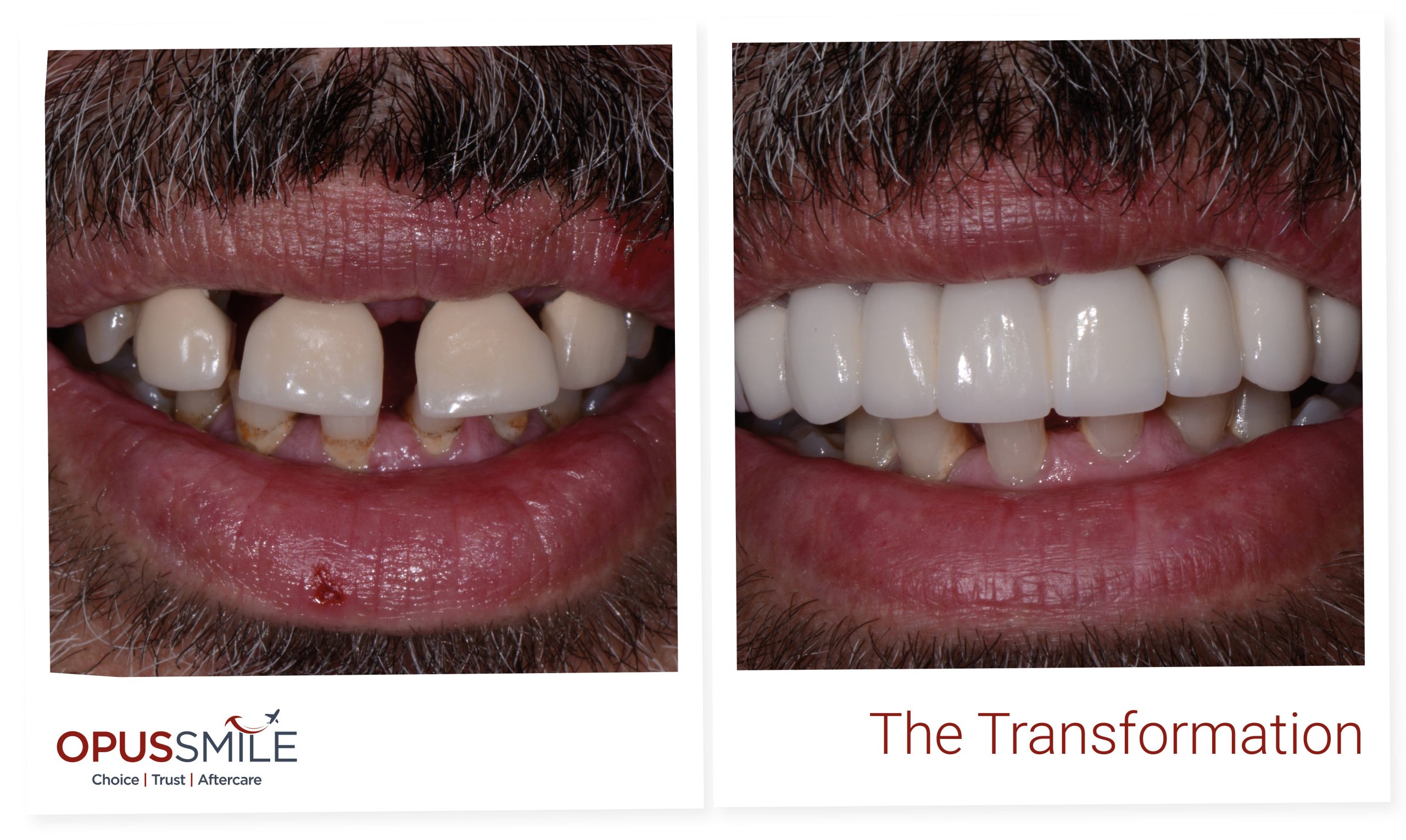
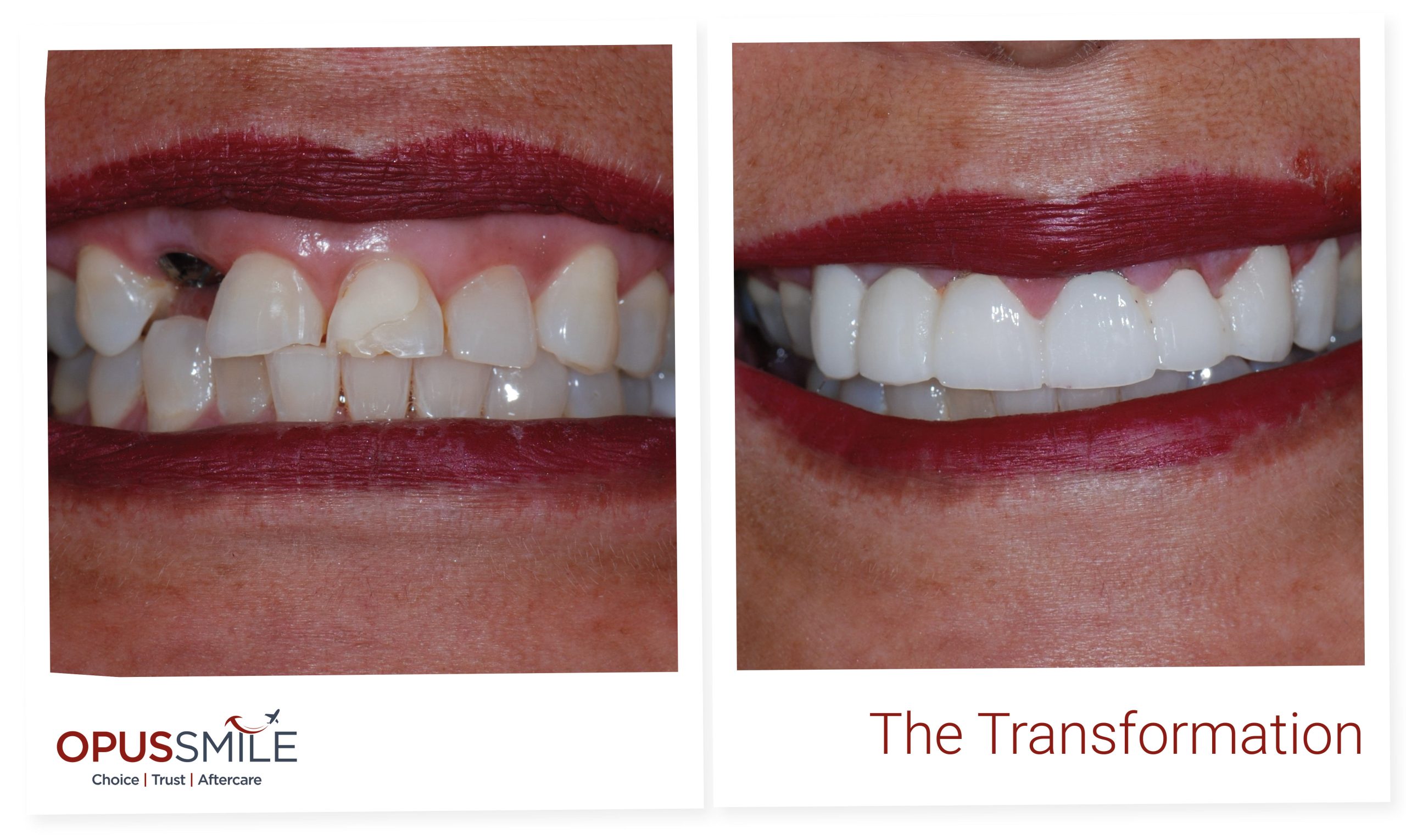
Comfort & The "Feel"
All surgery has small risks (infection, delayed healing, gum irritation). In rare cases, an implant may not fuse to the bone.
Our Protocol: We mitigate this with 3D Tomography scans, careful planning, and clean surgical techniques.
Your Part: Not smoking and keeping gums healthy are key to success.
Alternatives to Implants
Results & Aftercare
With good care, implants have high success rates and can last many years. The crown or bridge on top may need maintenance over time due to normal wear.
- Brush twice daily with a soft brush.
- Floss every day or use interdental brushes around the implant.
- Regular Check-ups to monitor bone and bite health.
- Wear a Night Guard if you grind your teeth (consult hygienist).
Single vs. Multiple?
- Single gap: One implant with one crown.
- Several missing teeth: Two or more implants can support a bridge.
- Most/All teeth missing: Usually a different plan (e.g., All-on-4). Check our specific pages for full-arch solutions.
Your Frequently Asked Questions About Dental Implants
Will the surgery hurt?
No. We use local anaesthetic, so you feel pressure, not pain. Mild soreness after is normal.
How long does treatment take?
Many cases take 3–6 months from start to finish. It can be longer if bone grafting is needed.
Can I have an implant the same day a tooth is removed?
Often yes, if the site is clean and there is enough bone. We confirm this at your scan.
What if I do not have enough bone?
We can add bone graft material or use other methods to build support before placing the implant
How do I clean around an implant?
Brush as normal and use floss or small interdental brushes around the implant every day.
Will people be able to tell it’s not a real tooth?
The crown is colour-matched and shaped to your smile. It should blend in naturally.
Can I chew normally on an implant?
Yes – once healing is complete and the crown is fitted. Avoid cracking hard items like nutshells or ice.
How long do implants last?
With good care and regular reviews, many last decades. Crowns may need replacement over time.
Are implants safe with airport scanners or MRI?
Implants do not set off airport scanners. For MRI, always tell the radiographer you have an implant.
Can I smoke?
We strongly advise not to. Smoking slows healing and increases the risk of problems.
Am I too old for implants?
There is no fixed upper age limit if you are healthy. We assess each person individually.
What happens if an implant fails to fuse?
It is uncommon. We let the area heal and can often place a new implant later.
Will I be left with a gap during healing?
Not usually. We can offer a simple temporary option in many cases while the implant heals.
Are implants better than bridges?
They are different solutions. Implants do not rely on neighbouring teeth. Bridges can be excellent too. We will explain which suits your case best.
What about full-arch solutions?
For many missing teeth, fixed full-arch options like All-on-4 or All-on-6 may be best. See our dedicated pages or ask us for a comparison.
Plan Your Trip & See Your Savings
Choose your treatment and (optionally) add a UK quote to see potential savings and a personalised travel timeline.
1) Treatment
2) Compare with UK
3) Trip Plan
This tool is for planning only and does not provide medical advice. Final treatment plans and prices are confirmed after clinical assessment.
Why Choose Opus Smile for Implants
UK-backed implant care across Europe | Single implants, implant bridges, full-arch options
Our focus is your result. We stand apart through clear expectations, honest guidance, and full support from first message to final review. Every clinic partner is vetted for safety, outcomes, and patient experience. Your plan is digitally designed and delivered by internationally trained clinicians.
You keep the best of both worlds: significant savings versus typical UK private fees plus a written warranty and UK-based aftercare. No bait pricing. No pressure. We assess first, explain options, and confirm exact costs only after proper diagnostics.
Hear it from real patients. Explore verified reviews on Trustpilot and see before-and-after stories that show natural, lasting smiles.
What you get with Opus Smile
- Named implant brands with traceable lot numbers written into your plan
- Digital planning (CBCT & guided placement where indicated) for accuracy
- Clear prices after diagnostics — no hidden extras
- Written warranty and UK-based aftercare network
- Temporary tooth/teeth where appropriate during healing
- Comfort options (local anaesthetic; sedation where available)
- Travel help and multilingual support at partner clinics

Hannah
Patient ManagerStill unsure? Let's chat.
Feeling uncertain? Speaking with a real person can provide the clarity you're seeking. I'm here to guide you from your first question to your final smile—no bots, just honest advice.